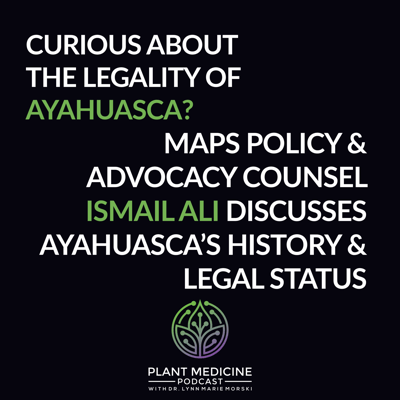Ayahuasca History and Legality with Ismail Ali
- 41
- 03/01/2020

Summary
Ismail Lourido Ali is the Policy and Advocacy Counsel at MAPS where he helps develop and implement strategies to create legal access to psychedelic substances in medical, sacramental, and personal contexts. Licensed to practice law in California, Ismail sits on the advisory committee of the Ayahuasca Defense Fund.
In this episode, Ismail discusses the history and legality of ayahuasca. He explains how people in the Amazon have been using ayahuasca for thousands of years, often as part of religious, spiritual, and community ceremonies. In the mid-20th Century, ayahuasca found its way out of the jungle and into American and European popular consciousness. However, in just the past few years, ayahuasca has expanded to a near-global level. Naturally, these changes have led to a new context for this plant medicine.
With the Controlled Substances Act of 1970, ayahuasca was swept up with other psychedelics for regulation. Interestingly, the plants themselves are not regulated under the 1971 International Convention on Psychotropic Substances, but the psychedelic compound it contains, DMT, is. Ismail explains why in the US, ayahuasca remains a Schedule I substance.
There are legal exemptions, however. As a result of the Religious Freedom Restoration Act of 1993 and a 2006 Supreme Court case, certain religious institutions are permitted to utilize ayahuasca in a sacramental context. The legality of ayahuasca use among other communities is still unclear.
The status of ayahuasca varies greatly outside of the United States. In theory, ayahuasca remains unregulated in any country that has not affirmatively regulated it. However, in general, ayahuasca is most commonly legally accepted in countries that have chosen to regulate it to a certain degree or permit it under particular laws.
With decriminalization movements taking hold across the United States, the status of ayahuasca has become as murky as ever. In cases like Denver and Oakland, ayahuasca still remains illegal. However, new statutes mean that enforcing laws against it are no longer a law enforcement priority. What this will mean in the long run is still unclear.
In this episode, Ismail discusses the history and legality of ayahuasca. He explains how people in the Amazon have been using ayahuasca for thousands of years, often as part of religious, spiritual, and community ceremonies. In the mid-20th Century, ayahuasca found its way out of the jungle and into American and European popular consciousness. However, in just the past few years, ayahuasca has expanded to a near-global level. Naturally, these changes have led to a new context for this plant medicine.
With the Controlled Substances Act of 1970, ayahuasca was swept up with other psychedelics for regulation. Interestingly, the plants themselves are not regulated under the 1971 International Convention on Psychotropic Substances, but the psychedelic compound it contains, DMT, is. Ismail explains why in the US, ayahuasca remains a Schedule I substance.
There are legal exemptions, however. As a result of the Religious Freedom Restoration Act of 1993 and a 2006 Supreme Court case, certain religious institutions are permitted to utilize ayahuasca in a sacramental context. The legality of ayahuasca use among other communities is still unclear.
The status of ayahuasca varies greatly outside of the United States. In theory, ayahuasca remains unregulated in any country that has not affirmatively regulated it. However, in general, ayahuasca is most commonly legally accepted in countries that have chosen to regulate it to a certain degree or permit it under particular laws.
With decriminalization movements taking hold across the United States, the status of ayahuasca has become as murky as ever. In cases like Denver and Oakland, ayahuasca still remains illegal. However, new statutes mean that enforcing laws against it are no longer a law enforcement priority. What this will mean in the long run is still unclear.
In This Episode
• How ayahuasca use has transformed from its origins in the Amazon to something that is known across the world
• How ayahuasca became a regulated substance in the United States
• Instances in which ayahuasca use is legally permitted
• The complexities involved in getting permission to legally use ayahuasca
• The legality of ayahuasca in various countries around the world
• How current and recent decriminalization efforts are changing the legal status of ayahuasca
Quotes
“We’re in an interesting time. We’re looking at a case study in the expansion of something that is more than just a plant, drug, or medicine. It’s really a combination of so many different cultural, political, social, and historical realities.” [6:35]
“Because there is really no effective structure to determine who does and doesn’t get an exemption, there are a lot of big questions that still need to be answered.” [15:58]
“Right now, technically nothing has changed from a legal perspective. But it’s absolutely true that we’re experiencing a pretty significant conversation shift because of decriminalization.” [33:55]
“It’s important to remember that part of the reason to do spiritual and healing work is so that we have the resilience to engage with the world as it is.” [36:51]
“Because there is really no effective structure to determine who does and doesn’t get an exemption, there are a lot of big questions that still need to be answered.” [15:58]
“Right now, technically nothing has changed from a legal perspective. But it’s absolutely true that we’re experiencing a pretty significant conversation shift because of decriminalization.” [33:55]
“It’s important to remember that part of the reason to do spiritual and healing work is so that we have the resilience to engage with the world as it is.” [36:51]
Links
* The Psychedelic Medicine Podcast has allowed the Psychedelic Medicine Association to post episodes as an educational resource, and in return the PMA is hosting the podcast show notes.


